Peter MALONE
Forever Prisoner, The
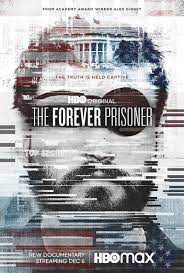
THE FOREVER PRISONER
US, 2021, 120 minutes, Colour.
Directed by Alex Gibney.
Alex Gibney is one of America’s finest documentary makers, prolific in the range of topics that he explores, from Lance Armstrong and his drug deceit to sexual abuse, Mea Culpa… to Scientology.
This is a film about American torture, specifically in Guantánamo and in the various secret locations set up by the CIA, here specifically in Thailand. It is not the first time that Gibney has taken up the theme of American politics, the CIA and American torture. It was the theme of his Oscar-winning Taxi to the Dark Side, probing during the 2000s, torture in Bagram, and Abu Graihb, Guantánamo. This documentary spans a decade, the establishment of torture, especially waterboarding, the subsequent use of this torture and, in 2017, interviews with several authorities who promoted the torture or who approved it.
The particular focus is on the well-known subject of waterboarding, Abu Zubaydah, the Palestinian terrorist who worked during the 1990s, linked with Al Qaeda, arrested, imprisoned, tortured – and still in prison, forever, even though never charged. And he is known for his sketches of his experience – which are featured in this film.
On the one hand, there are interviews with military officials, political officials, clips of Dick Cheney and Donald Rumsfeld, discussing the atmosphere after 9/11. And, much is made of the planning of 9/11, of the effect on the American public, on public opinion, on political decisions, on the war on terror, on the approval of torture for prisoners, allegedly beyond the Geneva Convention. Particularly strong – and alarming – is a television interview at Camp David with George Tenet, head of the CIA at the time, no holds barred concerning torture.
A great deal of the film is given to explanations of waterboarding, how it is done, the various effects of the person being interrogated, the amount of water, the time pouring, absorption by the victim, brought to panic and almost drowning. And with the sketches and diagrams.
Of particular interest and moving beyond Taxi to the Dark Side, are the detailed interviews with José Rodriguez, head of the Centre for Counterterrorism at the time of the torture, his being questions in 2017, his answers, his shifting of responsibilities, his rather calm responses to what are the equivalent of accusations. And, of particular interest, are the interviews with James Mitchell, a psychologist, brought in with his associate Dr Bruce Jessen, to oversee the treatment of prisoners, especially the waterboarding. There are excerpts from Mitchell at the time of the torture as well as of interrogations in 2016-2017. He explains himself as a patriot, working on the waterboarding with the approval of the American government, cautious at times as regards the procedure, water and danger of drowning, suggesting limits. After the abandonment of waterboarding, he and his colleague received an $81 million contract with the American government to explore methods for interrogation and security. Mitchell justified his work because it saved American lives.
Most audiences will be repulsed by this story of torture and waterboarding, a reminder of American torture in Korea, Vietnam, Afghanistan and…
One of the key interviewees of the film is Daniel P.Jones, given the task by the government for Senate investigations into torture, working over several years, finally presenting a report. His work was dramatised in the, unfortunately, little seen drama, The Report, featuring Adam Driver as Jones and Anette Bening as Senator Dianne Feinstein. In the film, James Mitchell was played by Douglas Hodge.
Themes of torture have been the feature of a number of feature films, allegations of justification in Zero Dark Thirty (as in this documentary), the torture in The Mauritanian and, ultimately, going to back to Abu Graihb and scenes of torture in Paul Schrader’s The Card Counter.
This is the kind of documentary that every American should see, that audiences concerned about American behaviour, CIA, torture, Guantánamo, should see and reflect on.
Falcone/ Excellent Cadavers
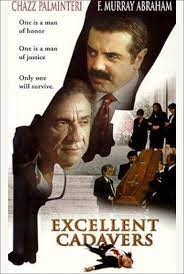
FALCONE/EXCELLENT CADAVERS
US/Italy, 1998, 86 minutes, Colour.
Chazz Palminteri, F Murray Abraham, Anna Galiena Andy Luotto, Arnoldo Foa, Ivo Garrani, Pierfrancesco Favino.
Directed by Ricky Tognazzi.
This is a very interesting, brief, story of the Mafia, Sicilian settings, settings in Rome. And it is a true story. The film was made in English with a cast of Americans and Italians. Director Ricky Tognazzi was a successful 20th century Italian director.
The focus is on Sicilian lawyer, Giovanni Falcone, played by Chaz Palminteri. The film gives his background, his work as a lawyer, his campaign against the Mafia, his personal life. The film also focuses on a range of lawyers and associates who support him in his work. And, as expected, there are a great number of mafiosi in the plot.
It depends on how interested audiences are in the Mafia in the 20th century, the havoc that they wreak in control, protection money, power in families, recruiting… The screenplay has some detailed attention to Falcone and his work as well as detailed attention on some of those charged, their appearances in court, the role of judges, sentences to prison and the frustration of twisting of the law as well as political influence for the release of the prisoners.
Falcone continued to work against the Mafia, frustrated in Sicily, moving to Rome, trying to get government involvement.
But, the film has a sad ending, the assassination of Falcone.
- The history of the Mafia in Italy? And the later 20th century? Mafia activities? Police investigations? Court cases? This film based on facts?
- Southern Italy, Sicily, Palermo, the 1980s and 1990s? The city, homes and apartments, courts and offices, police investigations, prisons, courts? The musical score?
- The focus on Giovanni Falcone, as a person, family, separated from his wife? Devoted to his job? His friendship with Paolo? His legal background? In action, links with judges, preferment, his work? Support? Antagonism?
- The history of the Mafia, the links, the screenplay providing information, the various networks, the upfront personalities, those behind the scenes? Manipulation? The range of assassinations, motor bike riders, shootings? Judges, lawyers?
- The film detailing Falcone and his determination, his work, examining documents, finding links, financial accounts? Discussions with the judges? Local authorities? The Italian authorities in Rome? The linking of the Mafia with politicians? Senators?
- His wife, concern for Falcone, setting him up for the meal, Francesco, her background, embarrassment, his apology, continuing the meal, the relationship, time together, compatibility, her support, the wedding, Paolo and his wife happy?
- Finally getting the documentation together, presentations the courts, despite the assassination of judges, the threats to Falcone? The roundup of the criminals, in the courtroom, behind bars, their shouting and jeers?
- The prosecution, the names, the crimes, the reactions? The tension about the judgements? The judges and their verdict of guilty? Imprisonment? Falcone and the sense of achievement?
- Falcone and his not being appointed as leading prosecutor, the decision to go to Rome? The release of many of the criminals?
- The years passing, Falcone and his work, with Francesco, supported by Paolo, the resentencing of the Mafia Chiefs?
- His decision to return to Palermo, expectations?
- The portrayal of the assassination, the bridge, the enormous explosions, deaths?
- The film as a tribute to Falcone and his achievement?
American Pickle, An
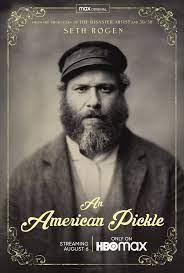
AN AMERICAN PICKLE
US, 2020, 88 minutes, Colour.
Seth Rogen, Sarah Snook.
Directed by Brandon Trost.
This is a tantalising American comedy, an American Jewish comedy. It is based on a short story by Simon Rich who wrote the screenplay. However, it is a star vehicle for Seth Rogen who plays two roles.
The title is accurate. In 1919, Herschel and his family migrated from Europe and settled in New York City, finding jobs, working in a pickle factory. However, he falls into a vat which is sealed and there he remains for a century until the vat is opened. He is alive and pickled.
This is a variation on the theme of vice versa and people taking others’ identities. Herschel is bewildered by the 21st-century but, with his shrewd background, Jewish ingenuity, he survives, tracks down one of his descendants, Ben, who works in IT and is trying to develop an app which will detect double dealings in business. However, he has been working on it for years and it has not been taken up.
On the one hand, Herschel and Ben bond, explanations to the old man, a visit the cemetery to see the graves of his descendants, upset that they are not looked after and that there is a huge billboard for Russian vodka looming overhead. Herschel relies on his knowledge of pickles, goes to the garbage containers of restaurants and finds their leftovers, working on them, successful, becoming famous. He becomes something of a cause célèbre, young people interested in his work, his personality, joining with him.
But, it is not all easy-going, Ben becoming envious, reporting Herschel to the police, scuffles, both in jail, Ben out of favour with his app because of his police charges. Herschel continues to have public support but Ben sets him up on a television program and taunts him about Christianity and Herschel lets loose, losing his audience.
Herschel is always scheming, getting Ben to help him to escape the law across the Canadian border, but shaving his beard and pretending to be Ben so that Ben is arrested for being Herschel and deported to Europe.
Some touches of a happy ending when Herschel realises that the app was called after Ben’s parents and that he was not, as Herschel suspected, uninterested in his family and lineage. Herschel goes to the village in Europe to meet with Ben.
Strong performances by Seth Rogen, obviously enjoying himself in the roles. Sarah Snook has a supporting role as Herschel’s wife.
- An American story? A Jewish story? A Jewish American migrant story? Poverty and prosperity? Screenplay by Saturday Night Live writer? Tone?
- The mood of the opening,-style screen format, the old town, central Europe, Herschel and is a ditch digging, work, poverty, dreams of drinking self so, of owning a gravestone, the encounters with Sarah, courting her, looking over the lake? The Cossack attack? Herschel and Sarah migrating to the US, settling, accommodation, the pickle factory? Sarah pregnant? Hopes?
- Official, the pickle factory, chasing the rats, authorities closing the factory down, Herschel falling into the that, being covered? Pickled?
- 100 years later, the demolition, the youngsters, the opening of the vat, Herschel emerging, the press conference, the hospital, treatment? The plausibility of his survival?
- Herschel, his character, the past, poverty, dreams, awakening in the 21st-century, the humour of his encounter with traffic, technology…?
- Discovering in, then and his life, age, the same as Herschel -100? His lifestyle, 21st-century New Yorker, Jewish background, his not practising, the contrast with Herschel and prayer and faith? Respect for the deceased? Ben and his, five years work, the logo? His lifestyle, alone, his apartment, mod cons? His enjoyment of 21st-century technology?
- The visit to the cemetery, Ben and his reluctance, Herschel finding the graves, spattered, the putting up of the hoarding, his fight, the arrest, in jail, bail, on Ben’s record? His hopes for his app, the company refusing because of the criminal record? His blaming Herschel?
- Herschel, the upset, leaving, the cucumbers in the garbage, the salt, the rainwater, the jars, making the pickles? The two men buying them, promoting them? The popularity? The crowds, on social media, followers? Everybody watching? Ben’s reaction?
- Ben, getting revenge, the health authorities, closing Herschel down, the fine? Herschel getting advice about interns? The crowds of young people, making the pickles, trading, selling?
- Herschel is a celebrity, the media, the television debate, the severity and prejudice of Herschel’s views, Ben asking the question about Jesus, Herschel’s outburst, everybody turning against him? Leading to deportation?
- The deal with Ben, to get Herschel to Canada? The trek through the woods, the border guards, Herschel’s attack on Ben, cutting his hair, disguising himself as Ben? Ben being deported? Ben and his experience in Europe, cold and hungry, the synagogue, the sympathetic help?
- Herschel, change of heart, coming to Europe? The plan to make an apology? To go into the pickle business and make a fortune? The final image of the two together – a future?
- The film is something of an allegory of the Jewish migrants of the early 20th century, poverty, enterprise and then making success in America, creating empires?
Violent Heart, The
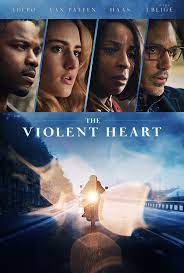
THE VIOLENT HEART
US, 2020, 107 minutes, Colour.
Jovan Adepo, Grace van Patten, Lukas Haas, Mary J Blige, Kimberly Williams-Paisley, Jahi di’Allo Winston, Jordan Preston Carter, Cress Williams, Rayven Symone Ferrell.
Directed by Kerem Sanga.
This is a drama set in the South, the story of Daniel who witnessed his sister leaving home when he was 15, following her, her being murdered in the forest. His played by Joseph Adepo and Mary J Blige plays his mother.
Daniel, 24, wants to join the Marines but works locally in a garage. It is there that he come across a precocious high school student, played by Grace van Patten. They are attracted. And it is a multi-racial romance in the town.
This has an effect on each of the two, Daniel and his plans, Cassie and her place in the plans and for herself.
Racial issues, violence issues, and commentators have suggested a touch of Romeo and Juliet (and others alluding to Othello and Desdemona).
- The title? Daniel’s heart? Cassie is hard? Her father’s heart?
- The setting, the city in the south, the visits to Nashville? Homes, school, classrooms, the lake, countryside? The city atmosphere? The musical score?
- The prologue, the family, Daniel and his camera, his age, devotion to his father, response to his mother, with Wendy, the feathers? The meal and the speeches to camera? Wendy leaving, Daniel and his bike, following, observing, the murder, trying to help Wendy? The later flashbacks?
- 15 years later, Daniel 24, his story, working in the garage, his absent father in Afghanistan, reputation in the Marines, Daniel wanting to join the Marines, the visit to the senator, her support, the authorities refusing because of his prison record? His telling the story to Cassie about his anger, blinding the boy, going to jail, reforming, getting diploma? Yet being on edge? The memories of the murder and its not being solved?
- Cassie, 18, in class, literature, her father as the teacher? Home life? With her mother? The car and arrangements? The encounter with Daniel, the garage, asking for a lift, her chatter, talking, the bond? Meeting Aaron? Going to the classroom, the door shut, her father’s explanation about changing the bulb? The woman leaving? Cassie and her suspicions, hostility, decision to go to Nashville, on the bike with Daniel, at the nightclub, his violent reaction, explanation to her? The night together?
- Daniel, upset at not being accepted in the Marines, relationship with Aaron, Aaron’s issue of the fight in the classroom, the principal, his mother apologising to the boy, Aaron and his fears declaration that he was not liked? The background, Wendy and her pregnancy…?
- The issue of the feathers, a tenuous clue but significant? Cassie fighting the further in the car, Daniel and his explanation of the feathers Wendy?
- Her confrontation of her father, his denials, confession, Cassie’s denunciation, his wife, Daniel arriving, the confrontation, the fight, Daniel killing the father, his own wounds, dying?
- Audience suspicions as to who did the murder, how early, no other suspect possible? And the surprise of the unhappy ending?
Naked Gun 33 1/3, The: The Final Insult
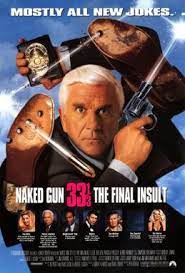
THE NAKED GUN 33, 1/3: THE FINAL INSULT
US, 1994, 83 minutes, Colour.
Leslie Nielsen, Priscilla Presley, George Kennedy, O.J.Simpson, Fred Ward, Kathleen Freeman, Anna Nicole Smith, Ellen Greene, Elliot Gould, James Earl Jones, Olympia Dukakis, Raquel Welch, Vanna White, Weird Al Jancovic, Joe Griffasi, Mariel Hemingway, Morgan Fairchild, Shannon Doherty.
Directed by Peter Segal.
Unless your middle name is “fastidious” (or “extremely fastidious”), you will enjoy much of this third episode in the Police Squad trilogy. It is full of puns, humorous non sequiturs, visual gags, parodies, loads of pratfalls… And they keep on coming. Perhaps there is some difficulty in that some sequences go on a bit, somewhat repetitious, and could have been pruned – the prison sequences, and, especially, the Academy Awards and the announcement of the winners (although there are some very funny nominees, especially the musical on Mother Teresa akin to the Sound of Music).
And, of course, it mainly depends on Leslie Nielsen’s presence. After a serious career (including appearing in The Forbidden Planet), in 1988, Nielsen appeared in the first Naked Gun film with his character of Frank Drebbin, hopelessly cruising through his career, accidents, bumbling, misinterpretations… And he continued for the next 20 years as the go to actor for all kinds of spoofs and parodies.
And his associates are, again, George Kennedy and O.J.Simpson. (And, ironically, the film was released the same year as Simpson was charged with the murder of his wife and her companion, the most sensational murder case in American legal history – and media!
Priscilla Presley is Nielsen’s wife, separated, the issue of having children, and an elongated episode full of innuendo as well as being explicit in Frank Drebbin’s visit to a fertility clinic while investigating the nurse (Playboy companion Anna Nicole Smith).
Fred Ward is the villain in prison planning a terrorist attack. And, veteran Kathleen Freeman has a lot of screen time as his tough mother. (And, at the Academy Awards, there are a number of guest stars with Pia Zadora doing a dance number with a literal fall into the orchestra pit, Raquel Welsh in conflict with Frank disguised as Phil Donahue, announces like Elliot Gould, Mariel Hemingway, James Earl Jones, Olympia Dukakis as well as television personalities Vanna White and Weird Al Jancovic.
There are also some amusing parodies of other films, including an elaborate parody of the Chicago station steps from The Untouchables, four prams and babies, Al Capone, shootouts, more and more troops coming in, President Clinton being shielded, even the Pope arriving and being shielded, and it all being a nightmare in Frank’s dreams. There is also a parody of Thelma and Louise and references, especially at the end, to Jurassic Park.
Difficult to know how these films will be received in the years after their release – but, at that time, there were well appreciated and probably stay happily in the memories of the fans of that time. The team writing and directing included David and Jerry Zucker, Jim Abrahams, Pat Croft, responsible for so many of this kind of comedy, especially the Airplane series.
Family, A/ 2020
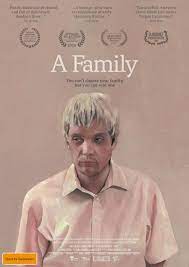
A FAMILY
Australia/Ukraine, 2018, 91 minutes, Colour.
Miksym Dernenyov, Larysa Hraminiska, Tatiana Kosianchuk, Pavol Lehenkyi, Liudmyla Zamidra,
Directed by Jayden Stevens.
The credits are a surprise. Two Australians, writer Jaden Stevens and Tom Swinburn, under the auspices of the Melbourne International Film Festival, have made this existential drama, filming in Kiev, with local actors, speaking local language.
Existential is important. And, while audiences are trying to appreciate the characters and the situations, highly contrived, a final character notes that “life is a maze”. And, the nature of a maze is that those who enter become trapped.
The central character is, indeed, trapped. He lives alone, solitary life in a very mundane house, with some glimpses outside to a rather drab lane and surroundings. The credits call him Emerson. He interviews a young woman with strange questions. A middle-aged couple turn up at his house. Later he interviews another man away from his house. The characters arrive, they have set lines, they recite them, he urges them to recite them with more energy and realism, he films them. They are his created family.
Emerson gets out of his loneliness by contriving home situations, getting the actors to perform them (and, by and large, they get into their roles). It is hard to know what satisfaction Emerson gets out of this filming as he is so inexpressive. When the young woman who works at a diner that Emerson frequents fails to turn up, the actors demand their pay, Emerson refusing saying that they get money only when the performance starts – there is a revolution.
The second part of the film has Emerson tracking down the young woman, going to her house, encountering her widowed mother who takes quite a shine to Emerson. In fact, he sets up house with the two women as if he were a husband and father. No filming this time but enacting family situations – and the mother certainly entering into the spirit of the performance especially the sexual relationship. There is a dance sequence with the young woman who imagines she has some talent. Finally, her boyfriend turns up and makes the comment about the maze.
This is very plain filming, the visual equivalent of the literary term, prosaic. Plain setups, some extreme close-ups at times, plain framing, almost unsaturated colour, the audience observers of this eccentric behaviour.
A film for arthouse audiences – and a commentator noting that its screening would be without any risk of financial success! A curiosity item, plainness stylised.
Iron Mask, The
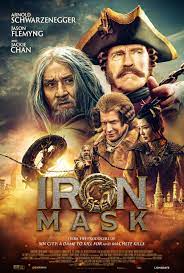
THE IRON MASK
Russia, China, United States, 2019, 116 minutes, Colour.
Jason Flemyng, Xingtong Yao, Jackie Chan, Arnold Schwarzenegger, Anna Churina, Yuri Kolokolnikov, Rutger Hauer. Li Ma, Charles Dance.
Directed by Oleg Stechenko.
This is the third film in a series of three by Russian director, Oleg Stepchenko, Viy/ Forbidden Koingdom (2014), The Iron Mask (2019) and a further film of the journeys of British cartographer, Jonathan Green, Viy 3, Travels to India (2022). The first film was highly successful in exhibition in Russia. For the second film, there is collaboration with Chinese producers, performers and the use of Chinese locations.
It is probably fair to say that this is not a film for a discriminating audience. It is really something of a visually lavish pantomime. Pantomime dialogue, exaggerated pantomime performance, special effects, magic, dragons and fantasy.
Jason Flemyng is Jonathan Green, the cartographer, in each of the film is, playing up to the style although he is the straight man for all the performers around him. He is invited to Russia by Peter the Great (who turns out to be in the Tower of London, with an iron mask). The authorities send him on to China so that he can work on the route from Russia to China, over a wide range of terrains, plains, snow, mountains to the Great Wall of China. He is accompanied by a young Chinese guide. Meanwhile his wife is concerned about him, wants to meet Peter the Great, defies her father (Charles Dance), accompanies the Russians back to Moscow and then journeys to China.
However, the Chinese guide is actually a young woman, the true princess who is returning home, to meet with the people and the rebels against the usurper who wears a mask making her appear like the young Princess. She has dragons at her whim. So, plenty of dramatic action, martial arts, Dragon magic in the China sequences.
However, it emerges that her father is imprisoned in the Tower of London where, of all people, Arnold Schwarzenegger is the commander. His performance takes us back to his early days in Hollywood with very un-nuanced performances (think Cactus Jack). The screenplay gives him a chance to wear 17th-century costumes and to have a range of fights with Jackie Chan. The older Jackie Chan is able to preserve something of his dignity.
Saturday matinee stuff, perhaps for younger audiences, but there are quite a range of adult themes – which may, of course, go over the heads of the younger audiences like the Dragons flying overhead!
Doi Mat Am Duong/ The Eyes
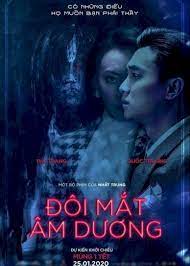
DOI MAT AM DUONG/ THE EYES
Vietnam, 2020, 100 minutes, Colour.
Directed by Nhat Trung.
A film for audiences interested to see the developments of Vietnamese cinema as the 21st-century progresses. It is also a film for those who enjoy “supernatural” elements in the human dramas, made very popular by many of the horror dramas from Japan.
The film is categorised as: comedy, drama, fantasy. Well, yes. Well not exactly.
The setting is an affluent Vietnamese family, comfortable home, professional backgrounds, he a doctor, she and artist. As the film opens, the artist has had a serious accident, has had an eye/cornea transplant, is attended to by her doctor husband. They have a little daughter. But, the wife suffers from amnesia – and, not only that, is haunted by seeing a young woman everywhere she looks, even encountering her as she looks in the mirror.
The artist visits galleries, sees her work, employs a diligent young man as her assistant. Her husband tries to support her. So far the film plays as drama, with some comic touches, especially in the eccentricities of the young assistant.
However, there are increasing strange encounters with the dead woman, some nightmare sequences. And then the artist wants to find more and more about the young woman who was a donor for the eyes, the young assistant getting information, taking her to visit the house, more information about the woman, sexually provocative and having affairs, the house empty but a security guard present, his giving some information, others in the vicinity not wanting to speak, especially the man who employed the young woman at the club.
The film then moves into melodrama, more reality about the young woman, the audience seeing her in action, her relationship with the artist’s husband, violent encounters, brutal attacks, deaths – and the revelation that the young assistant is the dead woman’s brother, which leads to more violent encounters between the young man, the doctor husband and the wife.
Rather a mixture of conventions and audience response depending on the interesting drama or the interest in fantasy/horror.
Some Kind of Heaven
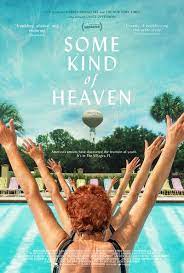
SOME KIND OF HEAVEN
US, 2020, 81 minutes, Colour.
Directed by Lance Oppenheimer.
Director, Lance Oppenheimer, is from Florida, did film studies interstate but was interested in the story of The Villages, the large retirement enclave, its lifestyle, the residents. He takes his audience inside The Villages, initially given the impression that it was partying seven days a week, some of the residents saying there they came to live not to pass away, that they were to live the dream, and, very specifically, the American dream. And, it seems very much the white American dream (one African-American giving a favourable comment on the place, the Hispanic-Americans seeming to be only on the staff).
The film opens energetically, kinetically, hyper- kinetically, in fact, elderly men and women in rowing teams, all kinds of dancing, all kinds of exercise, everyone seemingly on the go. It seems rather exhausting, especially for those of us sitting comfortably in our seats watching.
And then someone remarks that it is a Disneyworld for retirees, lots of fountain of youth language.
But, we then taken behind these exuberant scenes, being introduced to a number of the residents, one of whom, Ann Kincer, with whom we become more and more sympathetic as the film goes on, reminds us that this is not the real world, that it is not vacation every day, and that it is something of a bubble. And, in the vast area, it seems there are 130,000 residents.
As we go behind the cheery activities, we are introduced to real issues. One focus is on a very unsympathetic 81-year-old drifter, Dean, living in his van, trying to sponge on friends and relatives, going to The Villages to find a female companion, preferably with money. He does. She seems to know what he is after but she enjoys his company. We could have done with less of Dean throughout the film.
In contrast to Dean is Barbara, not long widowed, wandering rather forlornly through everything, an acting class, getting her nails done, getting her hair done, attending a session where everyone has a tambourine to hit in rhythm. Eventually, she gets a lift from the margarita man in his wagon, chats, dances, likes margaritas, seems to be finding some happiness.
However, the main narrative concerns a couple, Reg and Ann Kincer, 47 years married. He is an eccentric, not afraid of relying on some drugs, even cocaine, erratic behaviour, leading to his arrest, being charged, defending himself in the court despite the judge continually telling him he was the rudest defendant he had ever encountered. But Ann reminds us that she took vows, for better or worse, and she continues to support her husband. She is sympathetic in herself – but even more so in her support for her husband who would try even the most tolerant of cinema audiences!
So, would we like to go to The Villages and enjoy the lifestyle? The very extroverted lifestyle? Probably many of us would prefer to find some kind of quieter alternative.
An interesting exercise is to read the bloggers on the IMDb, many interested in the portrait of The Villages and the lifestyle as well as the portrait of the residents. Others, targeting The New York Times, one of the producing companies, suggesting that this is a hatchet job. And, a number of the actual residents in high dudgeon, considering this an unwarranted attack on the lives and lifestyle of those who live in The Villages.
Envoy: Shark Cull
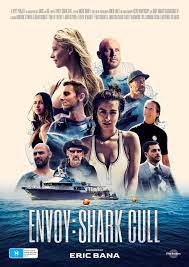
ENVOY: SHARK CULL
Australia, 2021, 102 minutes, Colour.
Narrated by Eric Bana.
Directed by Andre Borell.
For many of us (most of us?), hearing the word “shark” raises alarm bells. We know about shark attacks. We know the grim realities of swimmers and surfers, aggression and mauling. In fact, the opening minutes of this documentary offer an extensive collage of television comperes and hosts offering the grim news of what sharks have done (or wreaked).
However, this is a documentary in favour of sharks, in favour of a more sympathetic understanding, seeing incidents where people have been mauled and/or injured as far less frequent than the media might indicate, that we need to give some kind of re-consideration to the role of sharks in our ocean ecology, of protecting swimmers and surfers without detriment to the shark population.
And, so, the challenge of the title. The envoys?
We, humans, are to be the envoys to government and public opinion about the reality of the oceans’ shark population, the variety of sharks, their survival in the oceans, their interactions with humans. And, as narrated by the genial Eric Bana, this is persuasive.
The filmmakers have gathered about 10 experts in various fields to make their commentaries throughout the film. They are particularly fluent, particularly articulate, personally convinced, credible and persuasive. They include scientists, surfers, students, and an interview with a former Navy man who lost his leg and hand to a shark attack and who has had time to reflect and study the presence of sharks in our waters.
Throughout the film, of course, there are many sequences highlighting the sharks, moving through the waters, close-ups, expert underwater photography.
The film offers a challenge to the Federal and Australian state governments, critical of Queensland and New South Wales and their policies of culling and the particular means of protecting the beaches, devices introduced in 1937, details of the mesh and barriers, details of the anchor drops which trap the sharks. The point being made is that science and technology are continually finding more “humane” ways of warding off the sharks, without savagery, without destruction, without euthanising the sharks.
The film ends with commendation of moves in Western Australia and recommendations for further dialogue with government authorities and agencies. In fact, the morning after this reviewer watched the film, the Melbourne Age had a report that discussions were going on and one step was to change them terminology, to refer to “” rather than to “shark attacks”.
Interesting that Jaws is never mentioned, nor its theme played.